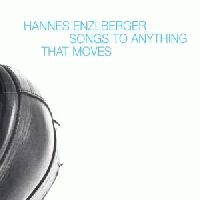 |
|
Between The Lines BSIN02342312 Enzlberger, Johannes - Songs To Anything That Moves Thomas Berghammer (trumpet, flugelhorn), Hans Steiner bass (clarinet), Oskar Aichinger (piano), Hannes Enzlberger (bass).
Trackslist:
1 It’s A Stony Way 8:10
2 Heisse Nächte 8:48
3 Losn 11:23
4–10 Sieben Versatzstücke 21:26
Recorded at Franz Hochedlinger Gasse 24, Vienna. December 21st & 22nd 2001.
Total Time 49:54.
All compositions by Hannes Enzlberger.
Carla Bley arrived in my life when I first started to take an interest in jazz, and has been there ever since. I had a tape of the Social Studies album, without any liner notes or list of tracks. Since I had no money to buy more tapes that tape played virtually day and night on a cheap cassette player and at some point it simply died on me. But the music had stuck in my mind, it was so much a part of me, and it stayed with me during my career as a musician in the years to come.
I was introduced to a completely different aspect of Bley’s music in the early nineties, when the recordings of the Jimmy Guiffrey trio from the early 60s suddenly appeared in the CD shops. They contained some of the early compositions by Carla Bley, including Postures, which inspired me to write Losn in 1991. «Losn», by the way, is an Austrian dialect word that takes on different meanings – even though the pronunciation is absolutely identical – depending on the language context: it means «leave it be» in Carinthia, and «listen» in Upper Austria.
Ten years later, I was commissioned by a Vienna music festival to formulate my long-standing bond with Bley’s music in a way that could be publicly performed. The first piece I wrote was It’s A Stony Way, a musical coming-of age story in fast-forward mode; it contained four chapters, entr’acte music and an epilogue.
I bought my first album by Carly Bley sometime in the mid-80s: it was called Escalator Over The Hill and I had someone buy it for me in Germany because it was out of stock in Austria. I opened the luxurious gold-coloured 3 lp box set, put the first record on the record-player – and was horrified at what I heard. That combination of shrieking free jazz and schmaltzy songs, sung by people who definitely weren’t singers, this combination of tracks whose only common denominator was that they didn’t fit together – shook my idea of Bley to the core. It took me years to recognise the special quality of that album. But as soon as I did, I knew escalator to be a unique piece of music in the history of jazz, a project in which musical fences were torn down and boundaries ignored for the sole purpose of giving expression to an utterly distinctive language. I have tried to do something similar, albeit on a much smaller scale, in my composition Sieben Versatzstücke, which represents a collage of my exploration of the escalator material.
For years, I considered Reactionary Tango, the first track on the social studies album, the absolute prototype of tango and for a long time I associated tango not with Argentina or Piazzolla, but with Carly Bley. That’s why, in 1988, my very first composition (for the orbits quartet I led at the time) was a tango entitled Heisse Nächte. (Hannes Enzlberger)
Preis:
17,90 EUR

|
|